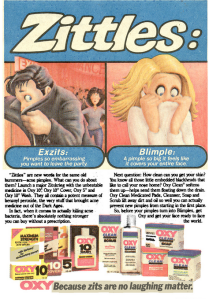FDA Warns Of Rare, Potentially Dangerous Hypersensitivity To Popular Acne Products
The FDA said it reviewed data from its Adverse Event Reporting System (FAERS) and identified 131 cases of “hypersensitivity reactions with serious outcomes” related to over-the-counter topical acne treatments containing benzoyl peroxide or salicylic acid.
While the total number of incidents accounts for all reports from 1969 through 2013, the FDA says that a majority of the cases in FAERS were reported from 2012 and after.
The incidents all involve reactions that go beyond the stated mild, brief irritation and redness one might expect from an acne treatment and which are already noted on the packaging for these products.
Of the 131 cases cited, 58 (44%) required hospitalization. The FDA categorized 50 (38%) of the incidents as anaphylactic hypersensitivity based on the presence of compromised respiratory or cardiovascular function in addition to skin or mucosal involvement (e.g., facial swelling, hives, angioedema, pruritus, flushing).
The remaining 81 cases were categorized as non-anaphylactic hypersensitivity because of the lack of associated respiratory or cardiovascular changes.
Nearly three-quarters of affected patients who then stopped using the acne products experienced some degree of recovery from their symptoms. A small number of patients reported a reappearance of their hypersensitivity reaction once the product was reintroduced.
While the number of people affected is small, the FDA is recommending that anyone who experiences hypersensitivity reactions — like throat tightness; difficulty breathing; feeling faint; or swelling of the eyes, face, lips, or tongue — should stop using the product. Additionally, anyone who develops hives or itching should also discontinue use.
The exact cause of these reactions is unknown. There is also no specific timeline for when a reaction could occur, with some reporting problems within minutes of applying the product while others didn’t notice any issues until a day later. Likewise, the products involved in these incidents represented the full range of topical acne products — gels, lotions, face washes, solutions, cleansing pads, toners, face scrubs, and others.
In addition to warning consumers, the FDA is recommending to manufacturers that they put information on their labels instructing consumers how to test for possible sensitivity. This usually involves placing a small amount of the product on your skin and waiting for a few days to see if there is any reaction.
“We are continuing to monitor and evaluate this safety issue, and will work with manufacturers regarding any future label changes that would address the risk of severe hypersensitivity reactions,” says the FDA.
Want more consumer news? Visit our parent organization, Consumer Reports, for the latest on scams, recalls, and other consumer issues.


